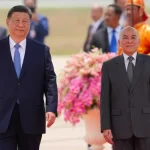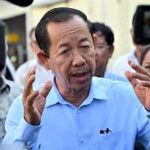Last week, China President Xi Jinping visited a series of close allies, including Cambodia, to reinforce strategic partnerships amid rising tensions and the threat of an escalating US-China trade war.
As the world waits to see how the US 90-day pause on tariffs will end, for countries like Cambodia, these global developments have laid bare their systemic economic issues. With an economy dependent on low-wage labor and exporting goods, it is clear that changes must be made regardless of ongoing global shifts.
For years, the regime in Phnom Penh has failed to enact economic reforms, improve transparency, or protect democratic institutions, and, instead, fostered an economy that is dependent on low-wage labour industries, unchecked corruption, and Chinese investment. Now, with enormous levies on goods destined for the United States still possible, key industries in Cambodia could collapse, and the ruling elite – rather than addressing the root causes of this crisis – may only tighten their grip on power.
The reality for Cambodia is that this is not just a trade penalty; it is a wake-up call. The country cannot afford to continue to pursue an economic policy that is dictated by political interests and short-term gains for the ruling elite, while everyday citizens struggle under rising inequality. Any pain that lies ahead should not be attributed to trade, in isolation, but to decades of mismanagement by the Hun regime, under Hun Sen, and now his son, Hun Manet.
In recent years, Cambodia has shifted ever closer to China, and deepened its economic and political dependencies. China now accounts for almost 50% of foreign direct investment (FDI) into Cambodia, while Beijing is funding massive infrastructure projects—from the controversial Dara Sakor resort and Funan Techo Canal to hydropower dams—which are designed to serve Chinese strategic interests. The ruling elite in Phnom Penh laud these investments as a sign of progress in the country’s heavily controlled state-run media, but the reality is far more troubling. Following meetings last week, the two countries celebrated the Sihanoukville Special Economic Zone (SEZZ), pushing for further investment; but for many locals, this investment zone has been disastrous. Like many other projects, it has failed to deliver long-term benefits to ordinary Cambodians, while environmental degradation, forced evictions, and exploitative labour conditions have become the norm.
This close relationship between the two has contributed directly to the proposed tariffs. When the Trump administration imposed levies on Chinese goods, back in 2018 and 2019, Chinese companies moved production to Cambodia to circumvent the additional costs. US officials have described Cambodia as “the most important transhipment hub that Communist China uses” – a backdoor for Chinese exports masquerading as Cambodian products – and state that these new tariffs are designed to close that loophole.
Stuck in the middle of an escalating power play between Washington and Beijing, low-wage industries in Cambodia will take the brunt of the pain, with around 53% in agricultural industries and the garment sector providing 640,000 jobs per month in exporting factories alone – many of them women. These jobs, already precarious, are now at risk. Meanwhile, Cambodia’s microfinance crisis is worsening. With the highest microfinance debt-per-capita ratio in the world and average loan sizes exceeding US$5,000, rural families are trapped in cycles of high-interest loans, often forced to sell their land just to keep up with payments. The collapse of garment exports will only exacerbate this financial desperation, while the government does little to intervene.
The sentiments echoed last week were of protecting free trade regionally, and the importance of the multilateral trade system, but if the regime fails to change its economic course, it risks deeper instability and international isolation. As an anathema as it may be to Hun Manet and others of his ruling circle, there are a number of reforms that could stave off the full impact of a potential trade distress, and better safeguard the interests of ordinary Cambodians.
First, the regime should introduce immediate relief for workers and small businesses. With thousands of families drowning in debt, the government should suspend collections for vulnerable groups and introduce protections against predatory lending before the crisis worsens.
Cambodia must also rethink its long-term economic strategy. The country’s future cannot be built on the export of cheap goods under fragile trade deals. Education and vocational training must become national priorities to create a skilled workforce capable of driving innovation and sustaining small and medium-sized businesses—the backbone of the economy. Despite heavy investment in regions like the SECC, the benefits have been felt mostly by Chinese corporations rather than Cambodians. A modernized workforce will help Cambodia move beyond its dependency on low-wage labour and attract sustainable investment.
Women, who account for nearly half the country’s workforce, must be at the center of this transformation, too. Economic reforms must address the deep inequalities that keep women from accessing leadership opportunities, STEM education, and fair wages. Currently, 70% of women are in vulnerable employment, and 65% of the microfinance borrowers in Cambodia are women. Gender equality is not just a moral imperative; it is key to unlocking Cambodia’s full economic potential.
None of these reforms will succeed, however, without accountability and the rule of law. Investors have long viewed Cambodia as a country where corruption dictates policy, where power is inherited rather than earned, and where ordinary people are punished for speaking out. The international community, including the United States, has already signalled its concern through legislative measures like the Cambodian Democracy and Human Rights Act (S. 2331) and targeted sanctions against corrupt officials – such as those against Ly Yong Phat for his role in human rights abuses and cybercrime. If the regime in Phnom Penh stays wedded to its current path, more diplomatic and economic consequences will follow.
As the global economic landscape continues to shift, the regime can either embrace meaningful reform and rebuild trust with the international community, or continue down the road of economic dependence on an aggressive and ambitious autocracy.
The choice is clear. What Cambodia needs now is not damage control, but transformation. It can, and should, change course.
Mu Sochua, a former Cambodian politician and Nobel Peace Prize nominee, is president of the Khmer Movement for Democracy (KMD).
Related Posts

Cyber-slavery Prevention Efforts Won’t Be Enough While Complicit Cambodian Regime Remains
- admin
- November 20, 2024
The international community is at last starting to show greater understanding of the threat pos ..

Hun Sen has been terrible for Cambodia. His son could be worse.
- admin
- August 11, 2023
Cambodians continue to fight for democracy, as a new generation of the elite – inexperienced ..

